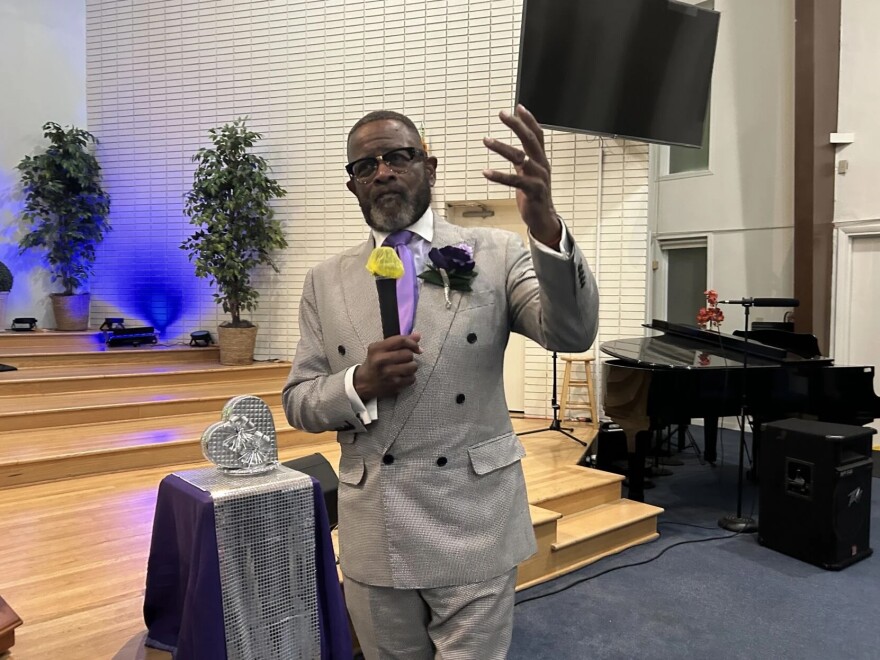For members of Trinity Christian Methodist Episcopal Church in Miami, last Sunday transcended the usual day of worship, marking the 100-year anniversary of its founding.
Under the roof of Bethany Seventh-day Adventist Church in Brownsville, churchgoers danced along to the soulful songs of the gospel choir and listened to guest speakers preach about what they believe has kept Trinity CME together for so long: a strong sense of family.
“The people are just family oriented,” said Pastor Calvin Hopkins. “They have struggled together. They have been victorious together. They have been through many different challenges and trials and come out on the other side in victory.”
But as they celebrated their centennial, longtime church members didn’t shy away from the challenges their congregation now faces. As attendance and financial investment in Black churches continue to dip, the community at Trinity CME is holding fast to ensure it lasts another 100 years.
Founded in 1925, Trinity CME originally served a primarily African American congregation, and has traveled locations within Miami to adapt to community growth and changes.
Many years later, the church is still searching for a permanent home.
After the COVID-19 pandemic forced the congregation out of its old building in the Lummus Park Historic District, the already-aging structure was left unattended for two years. Unable to afford repairs once they returned, the building went on sale in 2022, and it was sold in late 2024.
READ MORE: ‘I don’t want our legacy to die’: A family’s fight to keep Seminola’s history alive
Longtime member Diane Crumbley has been with the church for 78 years, and recalls a time when she would meet with a handful of fellow worshippers to practice in people’s houses. Now, she is helping her family church find a place to plant its roots.
“We’ve got people searching all the time,” she said. “We're hopeful that we can purchase a church with the monies we have so that we won't have a mortgage to pay. Because during this day and time, mortgages right now with the bank for churches — it's extremely difficult.”
Still, Crumbley believes they can brave the hardship, as they have many times before.
“We all know and love one another,” said Crumbley. “That kind of faith and that kind of togetherness and watching out for each other, keeping up with each other has kept us all strong and together.”
Pastor Hopkins also echoed the importance of togetherness, saying it is the key to addressing waning attendance numbers and financial backing.
Also during the pandemic, Trinity CME lost many congregants, some to death, others to isolation. Many shifted to virtual services on Zoom and never returned to in-person worship, but Hopkins believes the remaining core of committed members will see them through.
“We try to teach a message that causes us to not focus on what we don't have, but focus more on what we do have. And what we do have is some commitment in the hearts of the people to stay the course,” Hopkins said.

For Roosevelt Parker Jr., an eight-year member who plays bass guitar, that endurance stems from Trinity's connection to the broader Christian Methodist Episcopal denomination.
The nationwide network provided crucial support during the pandemic years when many independent congregations shuttered permanently.
"Because of the CME, and I say it's a corporation, somewhat of a huge committee, that has allowed us to be able to thrive through all of those hard times," Parker said.
But Parker does not sugarcoat the present struggles. With economic pressures preventing some families from working regularly, church funding has suffered.
“We're having some seriously strict hard times now because of our government. We're struggling with some of the families not being able to work, so that takes a lot away from the church,” he said. "We're still somewhat in the struggle and that needs to be known.”
Shanice Cherenfant, a 24-year-old whose family has been with Trinity CME for roughly 95 of its 100 years, says the pandemic and subsequent loss of their building represented something unimaginable: the dissolution of a constant in her life.
She remembers a vibrant church filled with children, potlucks, community outreach, concerts and festivals. That vibrancy is something she hopes will return in the future.
"Having not been in church for as long as we have been physically, and not seeing the people and not being in the community," she said, reflecting on the extended hiatus. The congregation maintained connections through Zoom and small outdoor gatherings, but nothing replaced the fullness of its former community life.
Still, the church's educational mission continues through support for area schools serving homeless and underprivileged students. Its commitment to civil rights and community care remains central.
"That kind of faith and that kind of togetherness and watching out for each other has kept us all strong and together," Crumbley said.
Through displacement, pandemic, and financial strain, Trinity CME holds to its founding principle: survival through mutual support.
Now, as Trinity CME searches for a forever home and works to rebuild, its members hold fast to what has always sustained them. Parker hopes to see members return and unite with renewed purpose.
"We made it 100 years, and we can make it another 100 years," Parker said. "But it really means that we have to work together."
This story was produced by The Miami Times, one of the oldest Black-owned newspapers in the country, as part of a content sharing partnership with the WLRN newsroom. Read more at miamitimesonline.com.
Miami Times Editor Note: An original version of this article misidentified the church as “Trinity Colored Methodist Episcopal Church.” The church in fact changed its name in 1956 to “Trinity Christian Methodist Episcopal Church.” The article has been updated.





